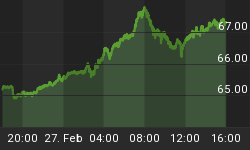A funny thing happened on the way to deflation...
The threat to core inflation has for some time been that the unwinding of the housing bubble could drag down the price of a substitute: rents. And, as one would expect, just as the bubble in housing helped pull rental inflation higher, the bust has helped to pull it lower (see Chart, source Bloomberg) and the lagged effect of the bust will likely continue to drag it lower for a time. But there are some signs that the bust in home prices may have nearly run its natural course, and that the unnatural Fed actions are therefore no longer necessary and perhaps dangerous.

For one thing, home prices are, roughly, back to being in-line with the long-run trend in rents, as the next chart (Source: Bloomberg) shows. Why does that matter? Recall that it is Owners' Equivalent Rent, and not home prices, that appear in CPI. Any deviation in the growth in home prices above or below the trend in rents - which measures what "the house as a place to live" is worth - essentially reflects the residual investment value of the house. But...and this is key!...since there's no reason to expect the investment value of the house, in the long run, to reflect anything more than the value of living in the house, these series ought to be very tightly related. And you can see that they were, prior to the late 1990s.

Now, inventory of unsold homes is still high, but if we have reached the 'market clearing price,' the inventory (as well as the 'shadow' inventory of homes people want to sell but haven't bothered to list because of market conditions) will eventually return to normal (see Chart, source Bloomberg). If prices drop below that market clearing price, then this will happen somewhat more quickly.

Now, the increase in median home sale prices (which also showed up in other data than the National Association of Realtors data, about which it is fair to be suspicious) is largely seasonal: home prices always rise in the summer. But even accounting for the normal seasonal pattern, it looks like home prices rose. The signs of life are very tentative, especially because the data are so noisy, but if home prices are finally back to the neighborhood of "fair value" then those signs of life are not entirely unexpected and we should be careful about cavalierly dismissing them.
The worry from an inflation standpoint is this: if there is some bottoming in home prices, it was clearly completely independent of the Fed's monetary stimulus. Prices are starting to bottom simply because they fell far enough. We ought, therefore, to be concerned about the answer to the following question:
"Then what other prices are being pushed up by the fiscal and monetary stimulus?"















